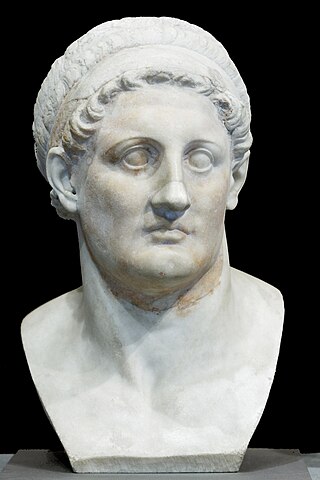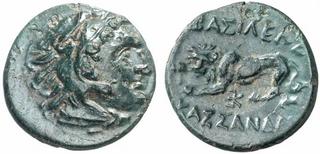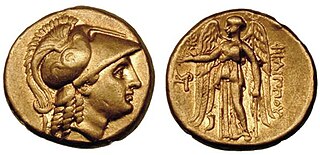Related Research Articles

Year 323 BC was a year of the pre-Julian Roman calendar. At the time, it was known as the Year of the Consulship of Longus and Cerretanus. The denomination 323 BC for this year has been used since the early medieval period, when the Anno Domini calendar era became the prevalent method in Europe for naming years.

Macedonia, also called Macedon, was an ancient kingdom on the periphery of Archaic and Classical Greece, which later became the dominant state of Hellenistic Greece. The kingdom was founded and initially ruled by the royal Argead dynasty, which was followed by the Antipatrid and Antigonid dynasties. Home to the ancient Macedonians, the earliest kingdom was centered on the northeastern part of the Greek peninsula, and bordered by Epirus to the southwest, Illyria to the northwest, Paeonia to the north, Thrace to the east and Thessaly to the south.

This article concerns the period 329 BC – 320 BC.
Year 321 BC was a year of the pre-Julian Roman calendar. At the time, it was known as the Year of the Consulship of Calvinus and Caudinus. The denomination 321 BC for this year has been used since the early medieval period, when the Anno Domini calendar era became the prevalent method in Europe for naming years.

Ptolemy I Soter was a Macedonian Greek general, historian, and successor of Alexander the Great who went on to found the Ptolemaic Kingdom centered on Egypt. Ptolemy was basileus and pharaoh of Ptolemaic Egypt from 305/304 BC to his death in 282 BC, and his descendants continued to rule Egypt until 30 BC. During their rule, Egypt became a thriving bastion of Hellenistic civilization and Alexandria a great seat of Greek culture.

Seleucus I Nicator was a Macedonian Greek general, officer and successor of Alexander the Great who went on to found the eponymous Seleucid Empire, led by the Seleucid dynasty. Initially a secondary player in the power struggles following Alexander's death, Seleucus rose to become the total ruler of Asia Minor, Syria, Mesopotamia, and the Iranian plateau, assuming the title of basileus (king). The Seleucid Empire was one of the major powers of the Hellenistic world, until it was overcome by the Roman Republic and Parthian Empire in the late second and early first centuries BC.

Perdiccas was a Macedonian general, successor of Alexander the Great, and regent of Alexander's empire after his death. When Alexander was dying, he entrusted his signet ring to Perdiccas. Initially the most pre-eminent of the successors, Perdiccas effectively ruled Alexander's increasingly unstable empire from Babylon for three years, until his assassination, as the kings he ruled for were incapable.

Antigonus I Monophthalmus was a Macedonian Greek general and successor of Alexander the Great. A prominent military leader in Alexander's army, he went on to control large parts of Alexander's former empire. He assumed the title of basileus (king) in 306 BC and reigned until his death. He was the founder of the Antigonid dynasty, which ruled over Macedonia until its conquest by the Roman Republic in 168 BC.

Cassander was king of the Ancient Greek kingdom of Macedonia from 305 BC until 297 BC, and de facto ruler of southern Greece from 317 BC until his death.

Alexander IV, sometimes erroneously called Aegus in modern times, was the son of Alexander the Great and Princess Roxana of Bactria.

Antipater was a Macedonian general and statesman under the successive kingships of Philip II of Macedon and his son, Alexander the Great. In the wake of the collapse of the Argead house, his son Cassander would eventually come to rule Macedonia as a king in his own right.

The Diadochi were the rival generals, families, and friends of Alexander the Great who fought for control over his empire after his death in 323 BC. The Wars of the Diadochi mark the beginning of the Hellenistic period from the Mediterranean Sea to the Indus River Valley.

The Wars of the Diadochi or Wars of Alexander's Successors were a series of conflicts fought between the generals of Alexander the Great, known as the Diadochi, over who would rule his empire following his death. The fighting occurred between 322 and 281 BC.

Eumenes was a Greek general, satrap, and Successor of Alexander the Great. He participated in the Wars of Alexander the Great, serving as Alexander's personal secretary and later on as a battlefield commander. Eumenes depicted himself as a lifelong loyalist of Alexander's dynasty and championed the cause of the Macedonian Argead royal house.
Polyperchon, was a Macedonian Greek general who served both Philip II and Alexander the Great and then played an active role in the ensuing battles for control between Alexander's generals.
Cleopatra of Macedonia, or Cleopatra of Epirus was an ancient Macedonian princess and later queen regent of Epirus. The daughter of Philip II of Macedon and Olympias of Epirus, she was the only full sibling of Alexander the Great. Her other siblings include half sisters Thessalonike and Cynane, and half-brother Philip III of Macedon.

Asander or Asandros was the son of Philotas and brother of Parmenion and Agathon. He was a Macedonian general under Alexander the Great, and satrap of Lydia from 334 BC as well as satrap of Caria after Alexander's death. During Alexander's reign Asander's position suffered for a period following Parmenion's execution, he was sent to Media to gather reinforcements during this time, and a year later was sent to Bactra.

The Partition of Babylon was the first of the conferences and ensuing agreements that divided the territories of Alexander the Great. It was held at Babylon in June 323 BC. Alexander’s death at the age of 32 had left an empire that stretched from Greece all the way to India. The issue of succession resulted from the claims of the various supporters of Philip Arrhidaeus, and the as-of-then unborn child of Alexander and Roxana, among others. The settlement saw Arrhidaeus and Alexander’s child designated as joint kings with Perdiccas serving as regent. The territories of the empire became satrapies divided between the senior officers of the Macedonian army and some local governors and rulers. The partition was solidified at the further agreements at Triparadisus and Persepolis over the following years and began the series of conflicts that comprise the Wars of the Diadochi.

Child of a Dream is an Historical Novel, the first part of Valerio Massimo Manfredi's Alexander trilogy, released in 1998. It narrates the childhood of Alexander the Great, son of King Philip II of Macedon and Queen Olympias, including his tutelage under the Greek philosopher Aristotle. It also focuses on Alexander's friendship with Hephaestion and Ptolemy, and his preparation to become a warrior able to lead the Macedonian Empire.

The kingdom of Macedonia was an ancient state in what is now the Macedonian region of northern Greece, founded in the mid-7th century BC during the period of Archaic Greece and lasting until the mid-2nd century BC. Led first by the Argead dynasty of kings, Macedonia became a vassal state of the Achaemenid Empire of ancient Persia during the reigns of Amyntas I of Macedon and his son Alexander I of Macedon. The period of Achaemenid Macedonia came to an end in roughly 479 BC with the ultimate Greek victory against the second Persian invasion of Greece led by Xerxes I and the withdrawal of Persian forces from the European mainland.
References
- ↑ Elizabeth Donnelly Carney (7 May 2019). Eurydice and the Birth of Macedonian Power. Oxford University Press. pp. 125–. ISBN 978-0-19-028054-3.
- ↑ A History of Macedonia. Volume 2 Review: John Cole
- ↑ Justin – 7.2.14 [usurped] . (He contended for the prize in various species of exercises at the Olympics)
- ↑ Thucydides and Pindar: Historical Narrative and the World of Epinikian Poetry by Simon Hornblower – SEG 30:648
- ↑ Aspects of Ancient Macedonian Costume -Μακεδόνες και Παναθήναια [ permanent dead link ], -Epigraphical Database SEG 49:842, SEG 45:801
- ↑ Boeotia — Amphiareion- Epigr. tou Oropou 520.10
- 1 2 3 4 Chronicon (Eusebius)
- ↑ Arkadia — Lykaion — IG V,2 550.17
- ↑ Pausanias a Guide to Greece
- ↑ Posidippus, Epigrams www.chs.harvard.edu
- ↑ Phokis — Delphi Syll.³ 424.42
- ↑ Boiotia — Oropos: Amphiareion — c. 80–50 BC Epigr. tou Oropou 528.12
- ↑ Greek and Roman Siege Machinery 399 Bc-Ad 363 By Duncan B. Campbell
- ↑ Phokis — Delphi FD III 1:477.13
- ↑ Phokis — Delphi BCH 1928:259.26
- ↑ Epidauros — c. 365–311 BC IG IV²,1 94 frg b.col I.1 -9
- ↑ Martial, Buch VI: Ein Kommentar by Farouk Grewing
- ↑ Macedonian Institutions Under the Kings Page 211 By Miltiadēs V. Chatzopoulos ISBN 960-7094-89-1
- ↑ Phokis — Delphi — stoichedon — FD III 5:19.74
- ↑ Phokis — Delphi — stoichedon — FD III 5:58.29-30